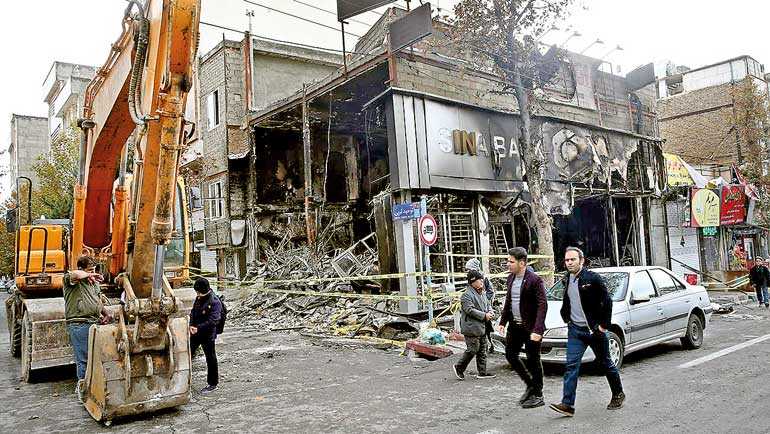Monday Feb 23, 2026
Monday Feb 23, 2026
Monday, 25 November 2019 00:02 - - {{hitsCtrl.values.hits}}

People walk near a burnt bank, after protests against increased fuel prices, in Tehran, Iran, 20 November - Reuters/ File photo
DUBAI (Reuters): Iranian troops and members of the elite Revolutionary Guards helped police quell violent unrest in Kermanshah province this week, Iranian officials said on Saturday, accusing ‘US agents’ of being among the armed protesters.
Rights group Amnesty International said at least 30 people were killed in the western province, making it the worst-hit by days of protests over gasoline prices rises in which more than 100 people were killed nationwide. Iran rejected the death toll figures as ‘speculative’.
The unrest appears to be the worst violence at least since Iran stamped out a ‘Green Revolution’ in 2009, when dozens of protesters were killed over several months.
“All the forces of the Revolutionary Guards, the (paramilitary) Basij, the Intelligence Ministry, police, and the army took part actively in controlling the situation,” Head of the Judiciary in Kermanshah Parviz Tavassolizadeh was quoted as saying by the semi-official Fars news agency.
“Tavassolizadeh said the rioters were armed,” Fars reported. “They confronted agents ... and burned public property.” Revolutionary Guards commander in Kermanshah Bahman Reyhani had said that the “rioters belonged to anti-revolutionary (exiled opposition) groups and America’s intelligence services”, according to the semi-official Tasnim news agency. Reyhani did not name the groups. Armed Iranian Kurdish militants have long operated near the province’s border with Iraq. Officials have previously blamed ‘thugs’ linked to exiles and foreign foes – the United States, Israel and Saudi Arabia – for stirring up the unrest, which led to the detention of about 1,000 demonstrators.
The Guards said calm had returned across Iran on Thursday.
Guards spokesman Brigadier General Ramezan Sharif said the protests had been initiated by royalists seeking the return of the Pahlavi dynasty toppled by the 1979 revolution, and the exiled Mujahideen Khalq armed opposition group, Tasnim reported.
He said ‘secessionist’ groups were also involved, apparently referring to ethnic Arab and the Kurdish militants.